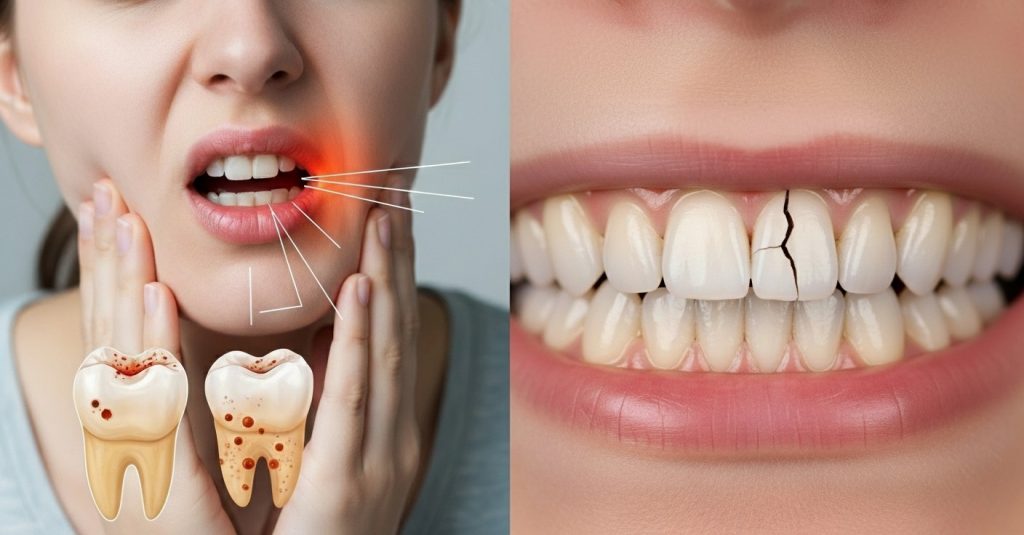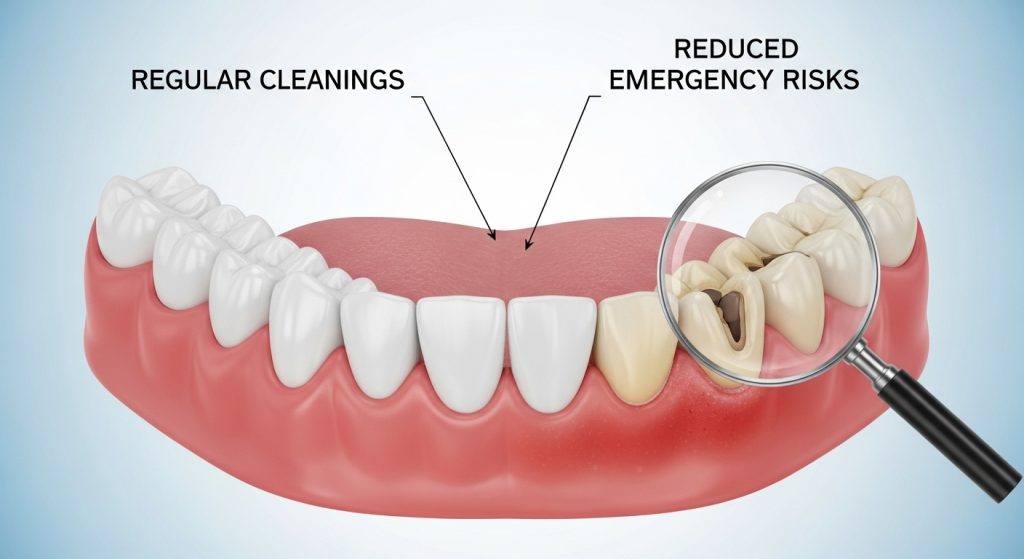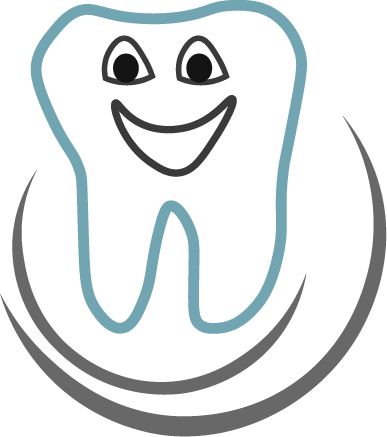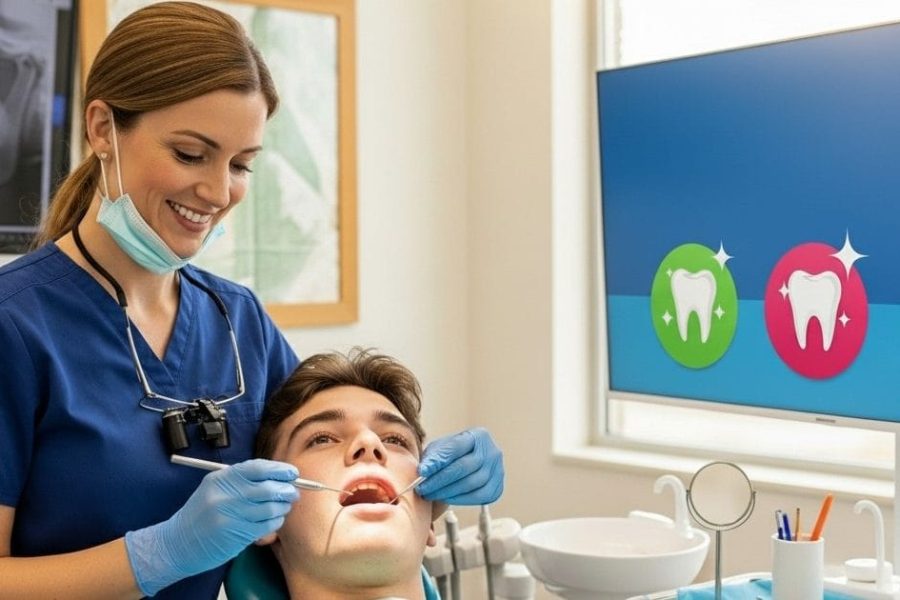Dental emergencies often happen without warning, causing pain and resulting in unexpected expenses. Fortunately, regular dental cleanings prevent emergencies by keeping your oral health in check. These teeth cleaning and dental hygiene appointments do more than just enhance your smile; they remove harmful plaque and tartar, reduce the risk of infections, and allow your dentist to catch issues before they escalate.
In this guide, we will discuss how regular dental cleanings can help prevent emergencies, highlight common issues they address, and share simple steps to maintain your oral health.
The Importance of Dental Cleanings
Dental cleanings are the backbone of preventive dental care, doing what daily brushing and flossing alone can’t. They target resistant tartar buildup and help your dentist detect early signs of tooth decay or gum disease before they become more severe. Conducted alongside routine exams, dental cleanings prevent emergencies by maintaining optimal oral health and identifying issues early. By committing to regular cleanings, you’re taking a proactive step to avoid painful and expensive dental emergencies in the future.
What Happens During a Cleaning?
A typical dental cleaning session includes several key steps designed to protect your oral health:
- Removing plaque and tartar: Your hygienist will carefully clear away buildup both above and below the gumline to prevent gum disease and decay.
- Polishing and flossing: This smooths your teeth, removes surface stains, and ensures a clean feel.
- Comprehensive oral exam: Often including X-rays to check for cavities, gum issues, or other structural concerns.
- Tailored oral hygiene tips: You’ll receive personalized guidance on brushing, flossing, and managing any specific risk factors.
- Fluoride Treatment: Many cleanings conclude with a fluoride treatment to strengthen your tooth enamel.
Beyond just cleaning your teeth, this process serves as an essential opportunity for early detection, showing how dental cleanings prevent emergencies by addressing problems before they worsen.
Benefits Beyond a Bright Smile
Dental cleanings do more than just enhance your smile; they also provide significant health benefits. By removing plaque and tartar, cleanings reduce the risk of cavities and gum disease while preventing painful infections that can lead to emergencies. According to Frontiers, good oral health supports overall wellness, with connections to better heart health, improved diabetes management, and even stronger respiratory health. A single visit to your general dentist for a cleaning appointment is a small investment with a powerful impact on your health and well-being.
Common Dental Emergencies and Their Causes
Understanding what causes dental emergency issues highlights the value of prevention. Many emergencies start as minor issues that go unnoticed until they escalate into significant pain or damage, requiring urgent medical attention. Regular dental cleanings can catch these problems early, preventing disruptions to your life.

Toothaches and Infections
Severe toothaches often stem from untreated cavities that worsen over time, allowing bacteria to reach the tooth’s pulp and form painful abscesses. This can lead to swelling, severe discomfort, and sometimes the need for root canal therapy or extraction. Dental cleanings prevent emergencies by reducing bacterial buildup, allowing dentists to detect and treat decay before it becomes a serious issue.
Broken or Chipped Teeth
While accidents can cause broken or chipped teeth, weakened enamel, an untreated fractured tooth, or decay, they can make teeth more susceptible to further damage. Routine cleanings strengthen prevention by maintaining healthier enamel and identifying vulnerabilities before they lead to structural issues. Although not all trauma can be avoided, healthier teeth are better equipped to withstand impact.
Contact Us for Help!
Seeking regular dental cleaning services tailored to your needs?
Book a consultation now to discover the best option for your smile!
How Cleanings Reduce Emergency Risks
Dental cleanings are a powerful tool for preventing dental emergencies by addressing issues before they become urgent. By removing harmful buildup, monitoring for early warning signs, and protecting your gums, cleanings significantly lower the risk of unexpected dental problems. The benefits of emergency dental services are a vital link between your daily oral care routine and professional oversight.

Early Detection of Issues
Cavities, cracks, and gum inflammation can develop silently without obvious symptoms. During a cleaning, your dentist can identify these issues early, before they turn into painful or costly problems. Early detection enables simpler, more affordable treatments, helping you avoid urgent, after-hours dental visits.
Preventing Gum Disease
Gum disease is a leading cause of dental emergencies. If left untreated, it can progress from mild gingivitis to severe periodontitis, leading to dangerous oral conditions, such as tooth mobility, bone loss, and infections. Regular dental cleanings prevent emergencies by removing the plaque and tartar that drive gum disease, safeguarding your oral health from long-term damage.
Tips for Maintaining Oral Health Between Cleanings
To maximize the benefits of professional cleanings, consistent at-home care is essential. By adopting simple daily habits, you can extend the protective effects of dental cleanings and further reduce the risk of emergencies. Prevention starts at the dentist but thrives through your everyday routine.
Daily Hygiene Practices
Keeping a daily routine for your oral hygiene goes a long way! You can start by doing the following things and keeping a journal to check them off your list:
- Brush your teeth twice a day for at least two minutes, using fluoride toothpaste to help strengthen your enamel.
- Floss daily to remove food particles and plaque from between teeth.
- Use an antimicrobial mouthwash if advised by your dentist to reduce bacteria.
- Limit sugary or acidic foods and drinks that fuel cavity-causing bacteria.
- Stay hydrated and consider chewing sugar-free gum to boost saliva production, which naturally protects your enamel.
Regular Check-Ups
Dental cleanings are just one part of a comprehensive preventive strategy. Regular dental check-ups, typically every six months, allow your dentist to monitor your oral health, update X-rays, and identify any hidden issues. For individuals with higher risk factors, such as gum disease or diabetes, more frequent visits may be recommended. Sticking to your dentist’s personalized schedule ensures long-term protection and helps dental cleanings prevent emergencies effectively.
Dental Cleanings Are Your Best Defense Against Emergencies!
Far more than a cosmetic boost, dental cleanings are a cornerstone of preventive dentistry. By clearing away harmful buildup, reducing the risk of infections, and catching issues early, they dramatically lower your chances of facing painful dental emergencies. Combining regular cleanings with consistent daily habits and routine check-ups will not only protect your radiant smile but also support your overall health for years to come.
FAQ
-
How often should I get a cleaning?
Most people need a cleaning every six months, but your dentist may recommend more frequent visits if you have gum disease, medical conditions, or other risk factors.
-
Can cleanings stop root canals?
Cleanings can’t reverse the need for a root canal once an infection has reached the tooth pulp, but they can prevent decay and infection from getting that far in the first place.
-
Is deep cleaning better than routine cleaning?
Neither is “better!” They serve different purposes. Routine cleanings maintain healthy gums, while deep cleanings (scaling and root planing) treat gum disease when it has already developed.
-
Are cleanings covered under CDCP?
Yes. Routine cleanings are under the Canadian Dental Care Plan coverage as preventive services; however, frequency limits and co-payments may apply.
-
What symptoms can a cleaning catch?
Cleanings help spot early cavities, gum inflammation, tartar buildup, loose teeth, cracks, and even failing dental restorations, issues that can become emergencies if overlooked.
Do you keep a routine for regular dental cleanings? What do you think of the difference they make for your oral health, or do you have questions about what they involve? Share your thoughts in the comments and join the conversation!





